Thomas Tuchel, who has managed Mainz, Borussia Dortmund, PSG, Chelsea and Bayern Munich, has succeeded Gareth Southgate as England head coach; is he the right fit? Sky Sports’ Peter Smith assesses his credentials…
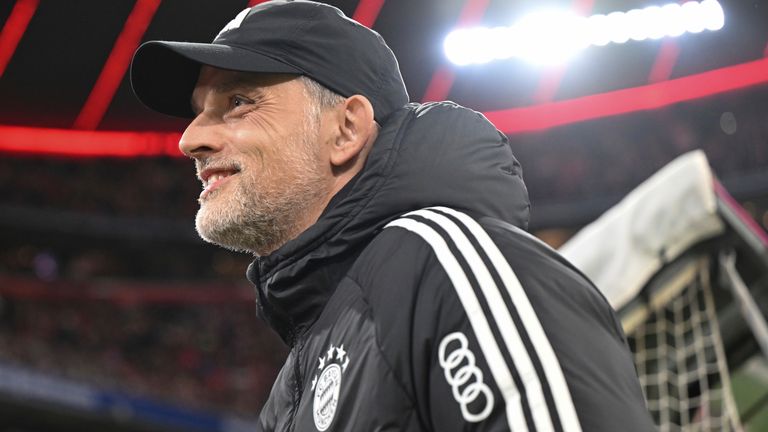
Image: Thomas Tuchel has succeeded Gareth Southgate as England head coach
Thomas Tuchel is England’s new head coach. Does the German have the skills and attributes required to finally deliver silverware for the national team?
Here we examine his impressive career to date and in particular his time at Chelsea to see what it tells us about his prospects as he takes charge of the Three Lions, including…
- Why he rejects his ‘defensive’ label – and a former Man Utd manager agrees
- Is his reputation as someone who falls out with executives and players fair?
- How he delves into data and detail for his tactical plans
- The running regime which helps manage his intensity
How Tuchel enhanced his reputation at Chelsea
Covid. The Super League. Russia’s war with Ukraine. An asset freeze. A takeover.
Thomas Tuchel should not have any trouble with the scrutiny, weight of responsibility and myriad topics an England boss is subject to questions on after his time at Chelsea.
- Thomas Tuchel appointed: Live reaction
- England appoint Thomas Tuchel as head coach
Tuchel is an impressive operator in front of the media. It is hard to imagine a more strenuous set of off-field circumstances for a football manager to have to cope with than those he faced at Chelsea, but the German repeatedly brought honesty, integrity and personality to his press conferences during his time at Stamford Bridge. It was admirable leadership in the most trying of circumstances.
Datawrapper This content is provided by Datawrapper, which may be using cookies and other technologies. To show you this content, we need your permission to use cookies. You can use the buttons below to amend your preferences to enable Datawrapper cookies or to allow those cookies just once. You can change your settings at any time via the Privacy Options. Unfortunately we have been unable to verify if you have consented to Datawrapper cookies. To view this content you can use the button below to allow Datawrapper cookies for this session only. Enable Cookies Allow Cookies Once
The credit to Tuchel is that, when he was sacked by Todd Boehly and co in September 2022, his reputation had been enhanced, both in terms of his work as a coach and as a figurehead for a football club.
With his additional high-profile experiences at Borussia Dortmund, Paris Saint-Germain and most recently Bayern Munich, there can be few managers who know better how to deal with the microscopic analysis made of operators at the very top end of world football and the challenges they face.
The England role is perhaps the most intensely scrutinised of them all – but Tuchel is well prepared for it.
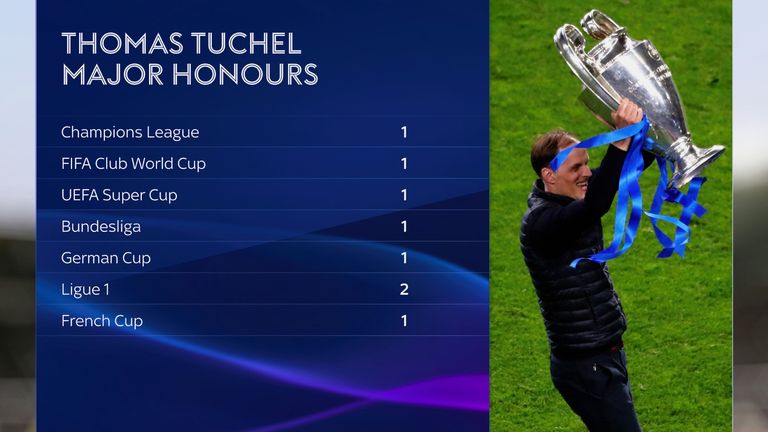
There will be many England fans disappointed the FA has again looked to foreign shores when appointing the national team manager. But, in footballing terms, there is good reason to be excited by what Tuchel can bring to the table.
A Champions League winner. A Bundesliga champion and treble-winner in France. But beyond the silverware and awards this is a coach capable of diving deep into tactical detail, motivating and uniting players for the cause and managing the message to the media. He ticks all the boxes.
Myth-busting: Is Tuchel a defensive manager?
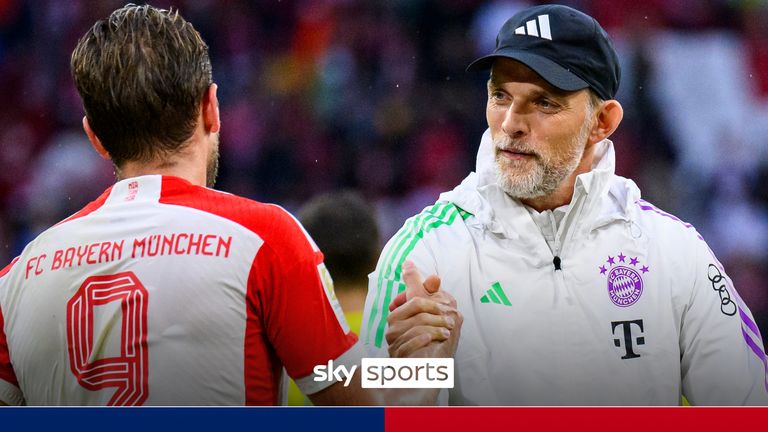
England captain Harry Kane told Sky Germany he was yet to hear from the FA about who will be the next England manager, but suggests Tuchel is a fantastic coach and person
“You have zero knowledge about football.”
There was the customary Louis van Gaal glare as the then-Netherlands boss hit out at a journalist for suggesting Tuchel was playing defensive football at Chelsea.
It was the international break of September 2021 and Chelsea’s canny Champions League final win over Man City, in which they had ceded possession but clinched the title with Kai Havertz’s goal on the break, was fresh in the memory. Pep Guardiola’s side were shut out but Tuchel – whose Chelsea side had kept 18 clean sheets in his first 24 games in charge – had been incorrectly profiled, argued Van Gaal. “With 5-3-2 you can attack very well and hats off to Tuchel for showing it.”
Tuchel chuckled as we discussed that viral video during a sit down at Chelsea’s Cobham training base a few days later. “He has this kind of brutal honesty which is what I really love,” Tuchel said of Van Gaal, the former Man Utd boss.
Gareth Southgate was much maligned for his style of play during his time in charge of the Three Lions. Not long ago the idea of an England manager taking his country to consecutive Euros finals but still being criticised would have been hard to comprehend. Yet clearly the demand is to win and win well. Make the most of this generation’s abundance of attacking talent… all while maintaining the balance Lee Carsley so badly lost against Greece.
Can Tuchel be that man to entertain and win? Or will he be deemed too defensive, like Southgate?
“Well, what is defensive and what is offensive? I think you can debate for hours and for weeks and in the end for years,” he said as our discussion led on to football philosophy.
“For me it’s more to stay active. If you take the Champions League final, we had not a lot of possession and of course we had to defend because of the quality of Man City but we never were passive. We never just parked the bus in front of the goal.
Datawrapper This content is provided by Datawrapper, which may be using cookies and other technologies. To show you this content, we need your permission to use cookies. You can use the buttons below to amend your preferences to enable Datawrapper cookies or to allow those cookies just once. You can change your settings at any time via the Privacy Options. Unfortunately we have been unable to verify if you have consented to Datawrapper cookies. To view this content you can use the button below to allow Datawrapper cookies for this session only. Enable Cookies Allow Cookies Once
“I had some games in Paris with PSG with ridiculous amounts of ball possession,” Tuchel continued. “But we could not speed it up, we could not accelerate in [a certain] game. So it felt like we controlled it, but it didn’t feel like attacking football.
“So what is attacking football? One of the best transition teams was Jurgen Klopp at Dortmund and with Liverpool in the last years. Sometimes they don’t have much ball possession, but then you see these fast attacks… and they have these fast attacks because they defended deep before.
“It’s important that it’s attractive, that it’s active and it’s intensive and you can show these attributes in all parts of the game, in the moment where you defend, and also when you attack.”
These are the fundamentals which drive Tuchel’s football philosophy.
Bringing the intensity
That interview – one of many conducted with Tuchel during his short but dramatic time in charge of Chelsea – came on the back of a remarkable rearguard defence at Anfield. Chelsea had been leading Jurgen Klopp’s Liverpool but Reece James was sent off moments before half-time and the resulting penalty levelled the match. Incredibly, Chelsea kept Liverpool at bay during the following 45 minutes with 10 players.
Tuchel put that draw down to the spirit created within the group: “This glue that holds everything together. You cannot even measure it but it has to be there.”
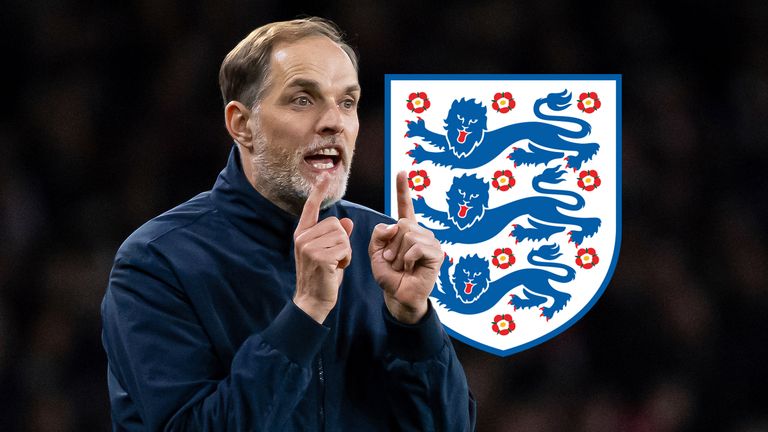
The challenge will be to create bonds and resistance levels like that at international level when contact time with players is much reduced to the everyday interactions of club football. But the image of Tuchel pacing the Anfield away dressing room floor, cracking his fist into the palm of his other hand and barking “come on, we can do this” during half-time, with the odds against his side, is a powerful one.
It is an intensity Tuchel brings on match days, when, according to insiders, he shifts from his usual quick-witted, joke-cracking persona into a more serious straight-talking version of himself.
The energy he brings to those decisive days is powerful – and hard to shake out. “When everybody was asleep after a late game and I was sure I could not sleep until 2am, 3am because of the emotions, I had to run to sweat it out and then it was easier for me to sleep,” he told me during another conversation.
Datawrapper This content is provided by Datawrapper, which may be using cookies and other technologies. To show you this content, we need your permission to use cookies. You can use the buttons below to amend your preferences to enable Datawrapper cookies or to allow those cookies just once. You can change your settings at any time via the Privacy Options. Unfortunately we have been unable to verify if you have consented to Datawrapper cookies. To view this content you can use the button below to allow Datawrapper cookies for this session only. Enable Cookies Allow Cookies Once
Running is a release. As well as those post-match middle-of-the-night workouts, Tuchel also regularly heads out on early-morning jogs. The search for those holistic benefits sum up the approach he brings to his coaching, to his life.
“It’s about discipline,” says the lean former defender. “It’s what you demand from yourself. It’s important… and it’s quite a challenge for me because I can get lazy and be a person that finds a lot of excuses not to go for a run and not to get out of bed early!
“I try to build routines to get up early and do it every day, to sweat and to demand it from yourself. It’s a certain type of discipline that helps you be more reliable, live more healthy and also be able to recover faster.
“I had for many, many years the impression that if I would do this I’d be asleep the whole morning but it’s actually the other way! I feel much, much better when I do it.”
As this picture of Tuchel’s mindset emerges, it is little wonder he has had run-ins through his management career with players or executives who do not match the levels he expects and demands.
There was a well-documented falling out with CEO Hans-Joachim Watzke at Borussia Dortmund, where Tuchel also had chief scout Sven Mislintat banned from the training ground. There was a headline-grabbing clash with Kylian Mbappe during a game for PSG, although his disagreements with sporting director Leonardo were more substantial. While at Chelsea, the breakdown in his relationship with Boehly led to his departure. There were bust-ups at Bayern too, with a reported clash with Joshua Kimmich contributing to Tuchel’s exit.
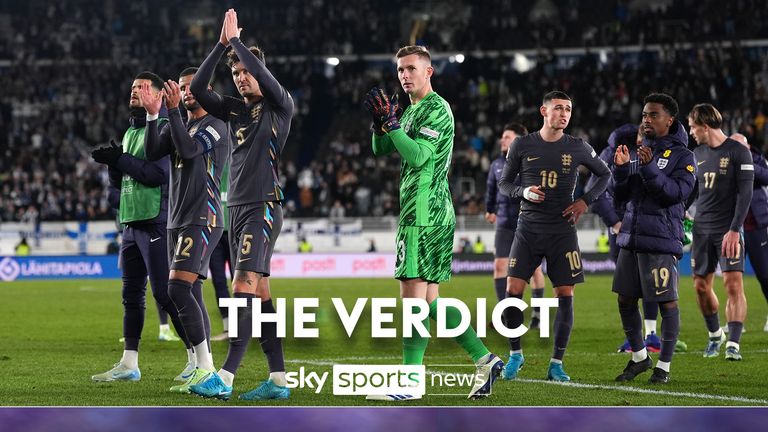
Sky Sports’ Tim Thornton is joined by The Mirror’s Chief Football Writer John Cross to discuss England’s 3-1 victory over Finland and who will be the next permanent boss
But if a reputation for division and confrontation precedes Tuchel, sources insist it is an unfair reflection of the relationships he builds. Former Chelsea director Marina Granovskaia and technical advisor Petr Cech were allies, while the Chelsea players trusted Tuchel and committed wholly to his instructions, as evidenced by that brilliant Champions League triumph.
Some players were sidelined but a united group was brought together.
In a role which has the divisive element of player trading removed and Tuchel is permitted near-complete control on the team’s operations, the prospect of significant bust-ups and fallings-out may be reduced.
In victory and defeat
For a manager who so clearly wears his heart on his sleeve on the touchline – who can forget that infamous handshake with Antonio Conte? – it is no surprise to hear how hurt and upset Tuchel was after the cup final defeats to Liverpool, both times on penalties, during his Chelsea tenure.
But it is illuminating to learn of Tuchel’s reaction to his greatest success. In the aftermath of that Champions League final victory over Man City in Porto, Tuchel stepped back, allowing his players to take the limelight. He passed his winners’ medal onto a colleague – albeit later returned. “To share it with everybody is incredible. We made it. Wow. I don’t know what to feel,” he told the media, 12 months on from losing at the same stage with PSG.
It is perhaps a reflection of Tuchel’s more insular nature. The diligent coach who pores over Expected Goals data to understand trends in his team’s play. The football-addict who consumes footage from across Europe in his spare time. And for whom, when all that work pays off, it is the moment to allow others to be congratulated.
Tuchel on his long-time use of data and xG…
“We knew about it for a long time and now it is out there in public, which I think is good because it gives you a more realistic view on your performance.
“Like with every number, the more you look into it you find your benchmarks. So we know how over a season or half a season what the level of Expected Goals is if you play in a certain structure and if this is suddenly higher we ask ourselves, ‘what’s happening within the structure?’
“If we concede double the amount we are tempted to say we’re in a very unlucky streak at the moment because obviously the quality that we give away is not enough to concede so much and still we concede.”
Tuchel certainly revels in the detail of his coaching sessions. He will have weeks and months to assess players, consider positions and combinations and training sessions in international football.
Whether that is to his benefit or detracts from the development of his ideas is to be seen but his methods have so far garnered respect in the game. Klopp is another high-profile admirer. “He’s a fantastic coach, you can really see his influence,” the former Liverpool boss has said of the man who followed him at Mainz and Dortmund.
England expectations
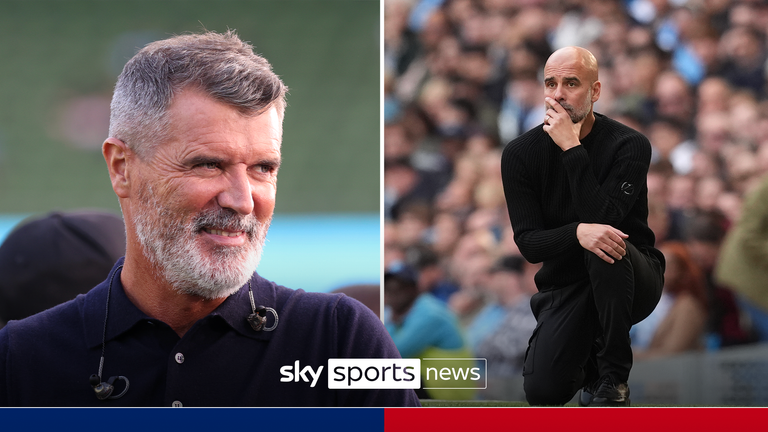
Roy Keane had said that England should target Manchester City’s Pep Guardiola to take charge
The immediate assumption when he takes charge of England is that it will be a return to a back-three, the system which delivered early success for Southgate but seemingly had to be replaced for his side to take the next step.
But just because that was Tuchel’s formation of preference during his most successful period at Chelsea does not mean it is a system he is wedded to.
Monterosa This content is provided by Monterosa, which may be using cookies and other technologies. To show you this content, we need your permission to use cookies. You can use the buttons below to amend your preferences to enable Monterosa cookies or to allow those cookies just once. You can change your settings at any time via the Privacy Options. Unfortunately we have been unable to verify if you have consented to Monterosa cookies. To view this content you can use the button below to allow Monterosa cookies for this session only. Enable Cookies Allow Cookies Once
He played a four-man defence for the majority of his spells at Borussia Dortmund, PSG and Bayern Munich. Instead, it is flexibility and adaptability which is the real essence of Tuchel’s set-ups.
Players’ positions are reimagined – think Ruben Loftus-Cheek playing wing-back against Real Madrid’s Vinicius Jnr in the Bernabeu – and interpretations of positional roles are tweaked: from high and wide full-backs at PSG and wing-backs at Chelsea to full-backs coming into more central areas rather than overlapping at Dortmund and inverting at Bayern. Those wing-backs helping to form a back five has been a feature in big games, too.
A double pivot in front of the defence was a preference at Chelsea, with Tuchel keen on building up his team’s possession numbers but also protecting against counters, although a sole holding player was used at Bayern where the Bundesliga giants dominated possession in most contests.
Will Angel Gomes continue in the role for England? Or will Tuchel prefer Declan Rice, who took on a more forward-running remit away to Finland last time out?
Tuchel’s defensive midfield is also supplemented by aggressive front-foot defenders stepping out from centre-back – in John Stones, Marc Guehi and Levi Colwill, Tuchel would certainly have strong options to recreate that.
His views on Harry Maguire will be interesting, especially as he backed Eric Dier despite the former Tottenham man being cast aside at Spurs. Up top, Harry Kane registered his career-best scoring rate under Tuchel last season. Expect the England captain to remain the focal point of the attack.
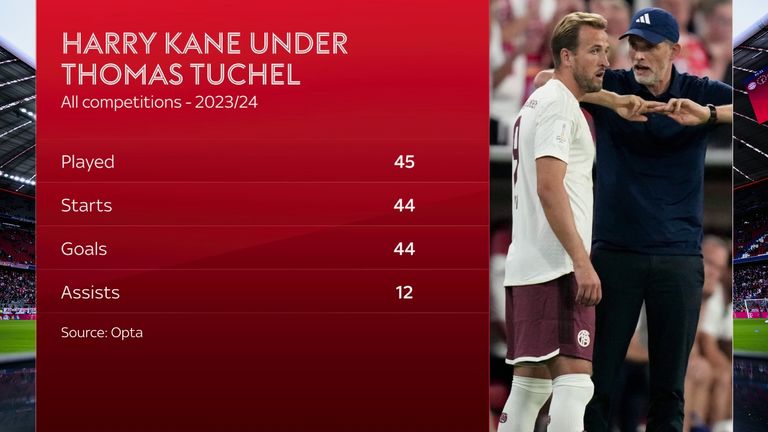
So what are the issues of concern?
Looking back on his time at Chelsea, certainly the departure of Antonio Rudiger and Andreas Christensen hurt the team and Tuchel, with their defensive numbers far worse in the second half of his reign.
Tuchel was also guilty of over-thinking or searching for unusual solutions during the final months of his tenure, with a 4-4-2 set-up leading to defeats to Southampton and Leeds, while Hakim Ziyech was strangely sent to left wing-back during Tuchel’s final game against Dinamo Zagreb.
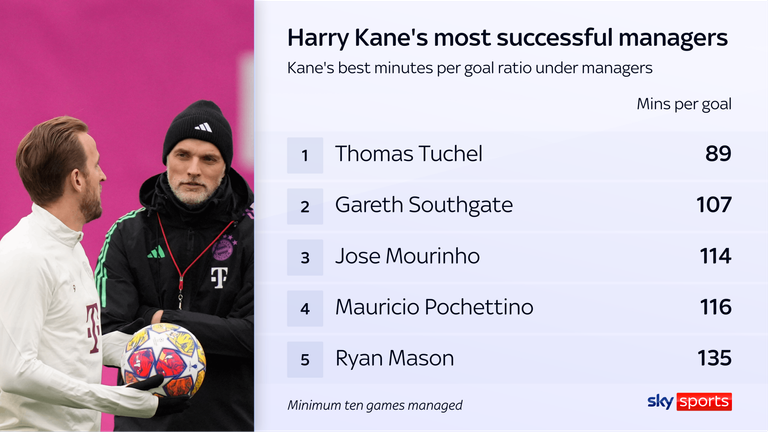
Goalscoring was an issue too. Chelsea scored more than twice in a match on 20 occasions during his 100 matches in charge. During the same period, Liverpool achieved the feat 32 times, while Pep Guardiola’s Man City did it 58 times.
Goalscoring was less of a problem last time out at Bayern, though, with the team top scorers last season with 94 goals in 34 games.
Just as in press conferences, Tuchel usually comes up with a convincing answer on the pitch to his critics.
There will be plenty of those when he becomes England head coach. Just ask Southgate about that. But Tuchel has the potential to take this team one step further than his predecessor.
Sourse: skysports.com